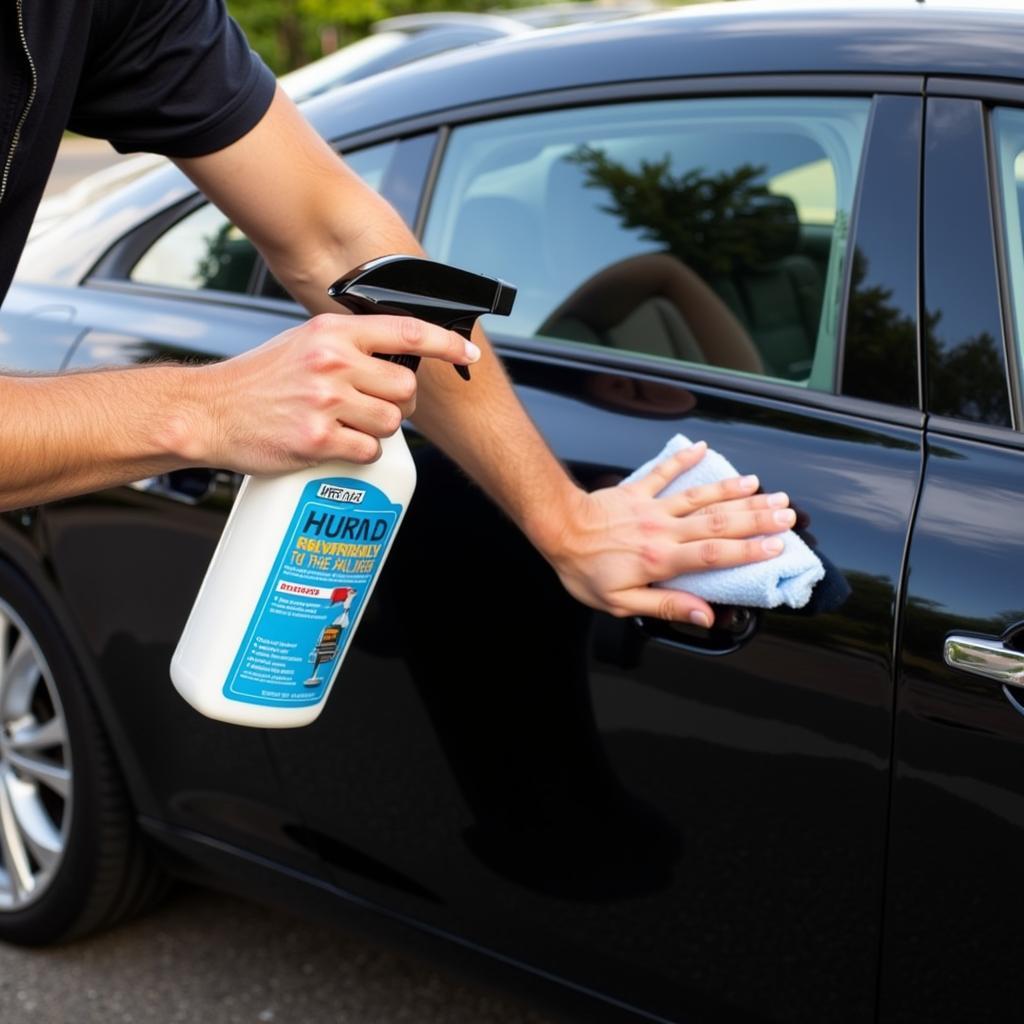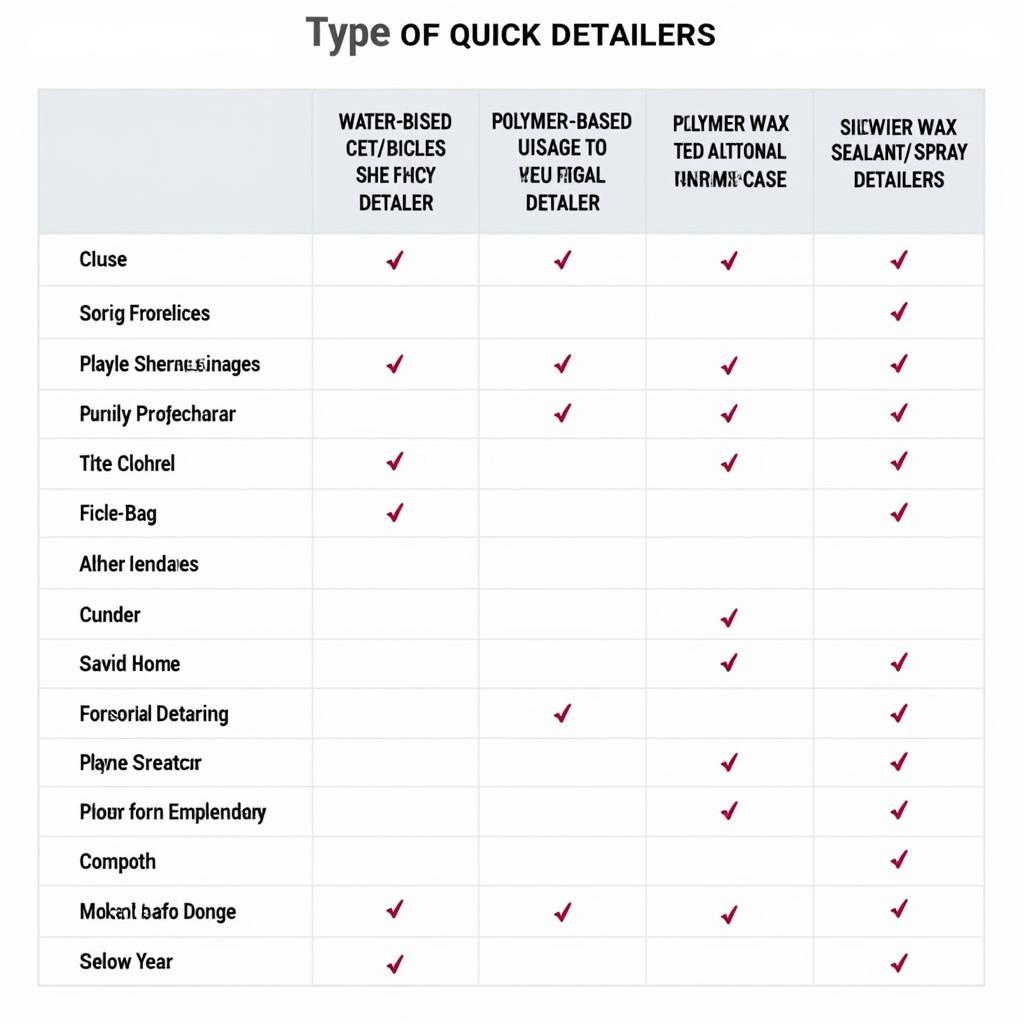Quick detailers are a staple in many car enthusiasts’ arsenals, offering a convenient way to maintain that just-detailed shine. But what exactly goes into these seemingly magical sprays? Understanding the composition of quick detailers can help you choose the right product for your car’s finish and achieve the best results.
Decoding the Quick Detailer Formula
Quick detailers are formulated using a blend of ingredients designed to clean, enhance shine, and protect your car’s paintwork. While the exact recipe varies between brands, the core components usually include:
-
Lubricants: These agents, often silicones or polymers, provide the slickness that allows dirt and dust to be safely lifted away without scratching the paint. They also contribute to the signature “just waxed” feel.
-
Cleaning Agents: Mild detergents or surfactants are incorporated to loosen light dirt and grime. These are carefully balanced to ensure effective cleaning without stripping existing wax or sealant layers.
-
Gloss Enhancers: Ingredients like polymers, resins, or natural oils help to boost the shine and depth of the paint, leaving a glossy finish.
-
Water: Water acts as the carrier for the other ingredients and helps to distribute the product evenly across the car’s surface.
-
Other Additives: Some quick detailers may include UV inhibitors for sun protection, anti-static agents to repel dust, or fragrance components.
Different Types of Quick Detailers
Not all quick detailers are created equal. Understanding the different types available can help you select the best product for your needs.
Water-Based Quick Detailers
These are the most common type and are generally safe for all paint finishes. They are ideal for removing light dust, fingerprints, and water spots.
Polymer-Based Quick Detailers
These formulas typically offer enhanced gloss and protection, thanks to the added polymers. They can also provide a degree of water beading and sheeting.
 Applying Polymer-Based Quick Detailer
Applying Polymer-Based Quick Detailer
Spray Wax/Sealant Detailers
These products combine the convenience of a quick detailer with the protective properties of a wax or sealant. They offer longer-lasting protection than traditional quick detailers.
What Quick Detailers Aren’t
It’s important to understand the limitations of quick detailers. They are not designed to replace regular washing or full detailing. how to make car detailing products provides more insight into creating your own detailing solutions, however, replicating the precise formulations of commercial quick detailers can be complex. Quick detailers are best used for maintenance between washes and are not effective at removing heavy dirt, mud, or bug splatters.
Choosing the Right Quick Detailer
With so many options available, choosing the right quick detailer can feel overwhelming. Consider the following factors:
-
Your car’s paint condition: If your car has existing wax or sealant, choose a quick detailer that is compatible and won’t strip the protection.
-
Desired level of shine: If you’re looking for maximum gloss, opt for a polymer-based or spray wax/sealant detailer.
-
Additional features: Consider whether you need UV protection, anti-static properties, or a specific fragrance.
“A high-quality quick detailer can significantly extend the life of your car’s wax or sealant,” says renowned detailing expert, James Peterson. “It’s a crucial tool for anyone serious about maintaining their car’s appearance.”
 Comparing Different Quick Detailers
Comparing Different Quick Detailers
Conclusion
Quick detailers are a valuable addition to any car care routine, providing a quick and easy way to maintain a clean and shiny finish. By understanding the ingredients and different types available, you can choose the right product to keep your car looking its best. how to detail a black car offers specific guidance for maintaining dark-colored vehicles. Don’t forget to consider your car’s specific needs and desired level of shine when making your selection.
FAQ
- Can I use a quick detailer on a dirty car? No, quick detailers are designed for light dust and grime, not heavy dirt.
- How often should I use a quick detailer? As needed, between washes, to maintain your car’s appearance.
- Do I need to wash my car after using a quick detailer? No, quick detailers are designed to be used without rinsing.
- Can I use a quick detailer on glass? Yes, most quick detailers are safe for glass.
- Can I use a quick detailer in direct sunlight? It’s best to avoid using any detailing product in direct sunlight.
- What’s the difference between a quick detailer and a spray wax? Quick detailers are primarily for cleaning and light shine enhancement, while spray waxes offer more protection. do dealerships detail cars price can give you an idea about professional detailing services.
- Are quick detailers safe for all paint types? Most are, but always test in an inconspicuous area first. You might find information on car detailing offered by specific manufacturers, such as does toyota offer car detailing. is jojoba oil good for car detailing explores the potential benefits and drawbacks of using natural oils in car detailing.
For any further assistance, please contact us via WhatsApp: +1(641)206-8880, or Email: [email protected]. Our customer service team is available 24/7.

Leave a Reply